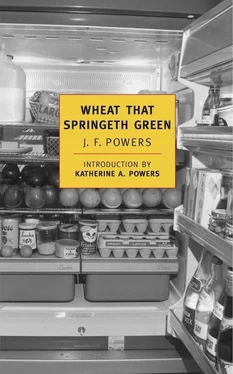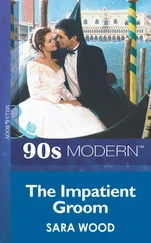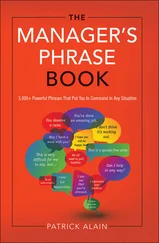J. Powers - Wheat That Springeth Green
Здесь есть возможность читать онлайн «J. Powers - Wheat That Springeth Green» весь текст электронной книги совершенно бесплатно (целиком полную версию без сокращений). В некоторых случаях можно слушать аудио, скачать через торрент в формате fb2 и присутствует краткое содержание. Год выпуска: 2000, Издательство: NYRB Classics, Жанр: Современная проза, на английском языке. Описание произведения, (предисловие) а так же отзывы посетителей доступны на портале библиотеки ЛибКат.
- Название:Wheat That Springeth Green
- Автор:
- Издательство:NYRB Classics
- Жанр:
- Год:2000
- ISBN:нет данных
- Рейтинг книги:5 / 5. Голосов: 1
-
Избранное:Добавить в избранное
- Отзывы:
-
Ваша оценка:
- 100
- 1
- 2
- 3
- 4
- 5
Wheat That Springeth Green: краткое содержание, описание и аннотация
Предлагаем к чтению аннотацию, описание, краткое содержание или предисловие (зависит от того, что написал сам автор книги «Wheat That Springeth Green»). Если вы не нашли необходимую информацию о книге — напишите в комментариях, мы постараемся отыскать её.
Wheat That Springeth Green — читать онлайн бесплатно полную книгу (весь текст) целиком
Ниже представлен текст книги, разбитый по страницам. Система сохранения места последней прочитанной страницы, позволяет с удобством читать онлайн бесплатно книгу «Wheat That Springeth Green», без необходимости каждый раз заново искать на чём Вы остановились. Поставьте закладку, и сможете в любой момент перейти на страницу, на которой закончили чтение.
Интервал:
Закладка:
“Father, just because somebody goofed…”
“‘Somebody,’ huh?”
“Have her call me back. I’m talking to Father now. Sorry, Father. How’s that again?”
“I have nothing to say.”
“I don’t care if she’s the Queen of Siam. I’m talking to Father now. Sorry, Father. Now here’s the way I look at it. Who’s to know these units don’t match? If you were a woman, it’d be different.”
“ What would?”
“Father, you don’t care. You’re a man .”
“Yes, but what if I want to dispose of these units some-day — to a woman?” (Joe was only thinking of what Mrs P. would say.)
“Father, you won’t. These units’ll last you a lifetime — and then some. All right , Foxie! I’ll talk to her personally ! Look, Father, you don’t have to decide now, on the phone. Just let the boys know your decision.”
Joe hung up. He let the boys know his decision, after which they left (with the cartons). Joe and Bill then made the bed. What was true of the bed pad was true, perhaps truer, of the sheets from the linen closet — all rather narrow, being singles, as Bill pointed out. Joe, who knew this but had been hoping that some sheets would be wider than they should be, said, “O.K., we’ll buy some doubles, and also a pad”—so he wouldn’t have to sleep right in the middle of the bed—“when we go out to eat.”
“’Lo, Ed,” Joe murmured, waving back at Ed Smiley, pastor of St Peter’s, Silverstream, who was at a table across the room with his curate and who, Joe had hoped, wouldn’t see him.
“He was out at the seminary once, on a panel,” Bill said.
“Ed was everywhere once, on a panel,” Joe said. “Smiley, of Smiley’s Shell, is Ed’s brother, you know. Smiley runs a good, clean station. He has to. You can’t mess around with Shell. Ed would be all right, or anyway better, if he didn’t think of himself as a charismatic leader in this our time. Hence the black leather jacket and the overalls he wears around the rectory [“Overalls?”—“You know what I mean”], the scooter he rides, the driv he talks [“Driv?”—“Drivel”]. Advised me to sprinkle grass seed in the snow and let nature do the rest. I believed him too, because I wanted to. That’s the trouble in the Church today. Too many clergy like Ed and too many people who want to believe ’em.” Joe watched the waitress bring the check to Ed’s table and give it to the curate. “The curate’s running the parish, Bill. Ed’s financially non compos.” Joe watched Ed follow the curate out of the room. “That’s the story on Ed, Bill. But his parishioners don’t know. So keep it under your hat.”
“Father, what’s the story on that phone call?”
Since the matter hadn’t come up when it might have — when they were making the bed, or when they returned to their offices, or in the car on the way to the restaurant, or during the meal until now — Joe had believed, because he’d wanted to, that Bill had decided not to pursue the matter, wisely and kindly, having perhaps seen the distress it had caused Joe earlier, that distress perhaps to be seen now. “It’s a long story, Bill.”
“You were hoping I wouldn’t ask you again?”
“Yes. Sometimes we don’t know what we’re asking, Bill.”
“I’d still like to know, Father.”
“Yes, well.” Until then Joe, who’d had two Martinis (Bill only one) and more than his share of the bottle of wine, might have done without a postprandial gin and bitters. The waitress, taking his order, looked unhappy (probably a Catholic or a non-Catholic), and Bill made it worse by abstaining and was obviously waiting to hear Joe’s confession.
“Yes, well. It’s customary for a pastor to be notified when he gets a curate, or change of curates. That wasn’t done in your case — not properly. Toohey called up and said I was getting a curate, but didn’t say who. ‘Letter follows,’ he said, and I haven’t heard from him since. No letter. Nothing.”
“That’s funny.”
“Yes, but that’s how Toohey plays the game, and not just with me, though that may have something to do with it — that it’s me. So I didn’t know who you were when you showed up, and you didn’t say — you didn’t get a chance to, as it happened, which was my fault. For days, though, I’d been under a terrific strain, not knowing who was coming, or when, and that being so I couldn’t tell anybody — Mrs P., Steve, Father Felix, the parishioners (in the bulletin). A hell of a situation.”
“You should’ve called the Chancery.”
“In the beginning, yes, but I was expecting the letter from Toohey. I was also expecting you to get in touch with me. All right. I was always out when you called. But if I’d called the Chancery, you might’ve been in trouble there.”
Did Bill, drawing on his baby cigar, see, as he hadn’t before, that Joe had protected him?
“A hell of a situation, Bill, and even worse after you came. I figured you’d introduced yourself to Mrs P., and Steve, and Father Felix, because none of ’em asked me your name. I hoped to hear one of ’em mention it, but I didn’t. A hell of a situation, as I say, and it went on and on.”
“You should’ve called the Chancery, Father.”
“I told you why I didn’t.”
“After I came, I mean.”
Slowly, Joe brought the glass down from his mouth. “You mean that?”
Bill looked as though he did.
“Use your nut, Bill. Put yourself in my place. Would you call up the Chancery to find out your curate’s name— after you’d met him?” Joe shook his head, trying to understand what Bill could have been thinking. “You think just because it was all Toohey’s fault, he wouldn’t talk? It’d be all over the diocese and beyond. Father Felix would hear about it at the monastery. ‘Hear the one about Joe Hackett?’ The joke would be on me. On us . So, for God’s sake, keep this thing under your hat.”
“You should’ve just asked me .”
“Yeah? When? A couple of hours after we met? The next day? This morning? What would you have thought if I had?”
“I don’t know, but it would’ve been better than this.”
“Yes, but I didn’t know it would be like this. I was trying to save us both embarrassment. I didn’t want you to think what you would’ve — of me, of the Church, of yourself. I didn’t want you to think you didn’t matter, Bill. And I don’t want you to think that now. So don’t. This is all Toohey’s fault. God help the diocese if they don’t make a bishop of him pretty soon. He’s doing untold harm where he is now. But I guess I don’t have to tell you that, now.”
“You think he’ll be a bishop?”
“Odds on. Oh, not here. Some two-bit see. I’m surprised it hasn’t happened before this. I don’t think the Arch likes him.”
“So what did you do?”
Joe was silent, thinking. They were back where they’d started, back to the phone call — it seemed unimportant now, after the embarrassing revelations. “I called someone.”
“Who?”
The waitress moved in with the check and was, for some reason, about to drop it on Bill’s side of the table.
“ I ’ll take that,” Joe said, annoyed with her.
“ Who? ”
“Look, Bill,” Joe said, annoyed with him. “I’ve told you what I can— why and how this thing happened. Believe me, it wasn’t easy.”
“I realize that, Father.”
“I’m damned glad to know your name, but I’m not about to say who told me. It wouldn’t mean anything to you if I did, but to me it would. I’m sorry.”
“I don’t blame you, Father.”
“You don’t? Well, thanks. I can see how you might.” Joe dropped some bills on the check, leaving more of a tip than he might have, in case the waitress was a Catholic or a non-Catholic, and swiftly departed, Bill following him.
Читать дальшеИнтервал:
Закладка:
Похожие книги на «Wheat That Springeth Green»
Представляем Вашему вниманию похожие книги на «Wheat That Springeth Green» списком для выбора. Мы отобрали схожую по названию и смыслу литературу в надежде предоставить читателям больше вариантов отыскать новые, интересные, ещё непрочитанные произведения.
Обсуждение, отзывы о книге «Wheat That Springeth Green» и просто собственные мнения читателей. Оставьте ваши комментарии, напишите, что Вы думаете о произведении, его смысле или главных героях. Укажите что конкретно понравилось, а что нет, и почему Вы так считаете.












